Editor's note: The State Council Information Office invited five people who have made contributions on the front line of the fight against the novel coronavirus pneumonia epidemic in Wuhan, Hubei province, to share their stories at a news conference in the city on Sunday.
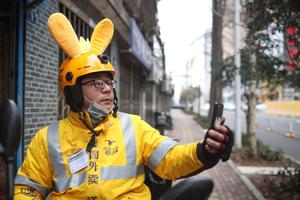 Wu Hui, food deliveryman. (PHOTO PROVIDED TO CHINA DAILY)
Wu Hui, food deliveryman. (PHOTO PROVIDED TO CHINA DAILY)
While most people are staying at home in Wuhan, Wu Hui drives a brand-new electric motorcycle across the city, delivering daily necessities and hope.
Wu, 39, returned to Wuhan to work as a food deliveryman for Meituan-Dianping, an on-demand service platform, after a business venture failed late last year. Since Jan 23, he has delivered over 300 takeout orders in the locked-down city.
"In the beginning, I felt that being a rider was a low-level job. But the situation gives it new meaning, because if we riders work normally, it means that many people are working normally and that the city is operating normally," he said.
Wu posts photos of the streets he rides along every day on his microblog, which has attracted more than 60,000 fans in the past 30 days. He's even become something of a celebrity among the tens of thousands of Wuhan residents who cannot go outside due to epidemic prevention measures.
Many people view his microblog every day and seek comfort. A 26-year-old netizen known as Xiaoqing is one of them.
"I cried when I saw your Weibo posts," she wrote. "Many of the photos you take are of the routes I used every day before the closure of the city. They are so familiar and so far away."
Wu comforted her via the WeChat messaging platform after work.
"It's not terrible at all. Don't be scared by yourself. Let's go to dinner together after the epidemic," Wu said, admitting he was scared, too.
But he said so many people needed him, and the "sense of being needed gives me the power to behave like a hero".
Wu said he plans to start a small business after the epidemic is defeated.
"I want to go home to see my mom," he said. "As ordinary people, our greatest wealth is our own life experience."
Future expectations
Because of my job, I meet all kinds of people working at the grassroots level like myself. For example, a co-worker told me one customer wanted to hug him. Another time, seeing that I was carrying too many things, a woman working at the fruit shop helped me pack goods to be delivered. A young woman from the post office helped me find a bigger carton for repacking. And once, because an elevator had stopped working, I saw a deliveryman carrying two large bags and climbing the stairs slowly. With so many ordinary people sticking to their posts, I believe that the virus will be defeated.
After the epidemic is over, I hope that people will understand ordinary workers more and give them more respect. At that time, I also hope to have more orders and make more money. I can live better in Wuhan. I still have a small wish that if conditions are met, I can start a business again and restart my life. Finally, I hope I can go back to see my mom.
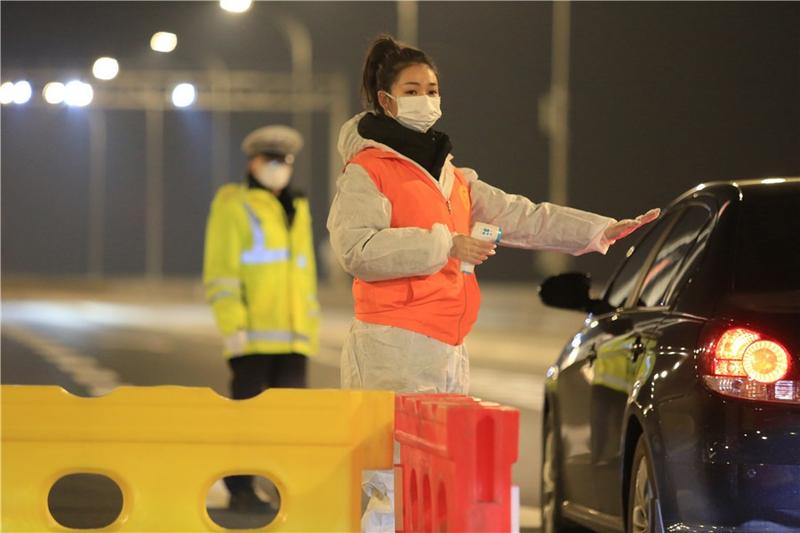 Hua Yuchen, volunteer. (PHOTO PROVIDED TO CHINA DAILY)
Hua Yuchen, volunteer. (PHOTO PROVIDED TO CHINA DAILY)
Hua Yuchen, a music teacher at a primary school in Wuhan, immediately registered when she saw a notice on the WeChat social media platform seeking to recruit volunteers on Jan 23, the day the city government announced the lockdown of the city.
"The notice said volunteers with certain skills were preferred, such as cooking and driving," she said. "I have a car and always drive to work, so I joined."
Back then, Wuhan, the epicenter of the novel coronavirus outbreak, was witnessing a rapid increase in the number of virus patients. The city lockdown was imposed just two days before the Spring Festival in an effort to contain the virus within the largest city in Central China, which has a population of more than 11 million.
"At first, I had no idea of what work I was going to do," said Hua, who teaches at Ganghua Primary School in the city's Qingshan district. "But as a Wuhan native, I knew I must do something for my hometown, even though I am just an ordinary person and cannot rescue patients as doctors do."
Following the lockdown, all public transportation in the city was canceled, so many doctors and nurses who usually commuted by bus or subway had to walk to work in the beginning, Hua said. One of the first volunteers following the outbreak, she became a volunteer driver, shuttling medical workers between their homes and hospitals.
Over the past month, Hua has also kept herself busy with different assignments, including helping to load various materials from trucks sent from outside Wuhan, standing at highway exits to test drivers' temperatures, and broadcasting news to novel coronavirus pneumonia patients via the intercom at a temporary hospital.
"I feel lucky that I chose to volunteer during this very unusual period," she said. "If I hadn't been, I may have been like some of my friends, who have been obsessed with sorrow, helplessness and anxiety. But now I am happy, and every day I am obsessed with finding out where I am most wanted."
Future expectations
What I hope for most is to see the epidemic end as soon as possible so patients can reunite with their families. I hope to see the medics return home safely.
As a volunteer I hope all volunteers can remain safe and that we can take off masks after the epidemic is over, so we can have a chance to know each other in another way and hug each other.
As a teacher, I am waiting for the school to open again. I miss my students and their smiling faces.
As for myself, I want to go shopping with my best friends. The most important thing is for us to be able to go outside and enjoy the air and sunshine freely.
Last, I hope those who have come from outside Wuhan to help the city fight the outbreak will come back again after it's over, and we will show you around, so you can see the city in a way that you may not have had the chance to before. The people of Wuhan will always remember you and thank you.
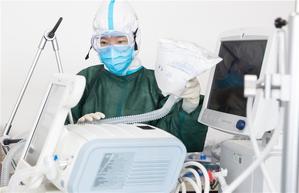 Zhao Peiyu, nurse. (PHOTO PROVIDED TO CHINA DAILY)
Zhao Peiyu, nurse. (PHOTO PROVIDED TO CHINA DAILY)
Zhao Peiyu, head nurse at Beijing's China-Japan Friendship Hospital, has battled novel coronavirus pneumonia for about 20 days in Wuhan, Hubei province, the epicenter of the outbreak.
Zhao, who has been a nurse for nearly 18 years, volunteered for the medical aid mission to Hubei and now leads her hospital's nursing care team in the province.
"My colleagues gave rather positive responses to the call for volunteers when they were informed about the epidemic," the 42-year-old said. "Around 930 nurses at our hospital submitted applications. Some of them said they were experienced because they had fought against severe acute respiratory syndrome (in 2003), and some said they were obligated to join the battle as Party members."
She said they were anxious when they arrived in Wuhan.
"We are facing a totally new virus and disease that we've never seen before," she said. "As the team leader, what I worry about most is the security of my team members.
"But we are nurses who give not only professional nursing care to patients but also encouragement and psychological support. We are riding out the epidemic together with people in the city and the Chinese people."
She said she had been impressed by a female patient in critical condition who had received a tracheotomy because of her severe symptoms.
"I found her writing 'water' using a hand on her quilt, so I asked if she wanted water to drink and she responded with a blink," she said. "I told her that she was not allowed to drink water because of the tracheotomy, she then blinked and gave me a thumbs up.
"I was touched. I can feel her desire for life and also the trust in us-the medical workers. Thankfully, she is getting better now."
Zhao said her team had received over 60 patients with severe symptoms or in critical condition in the past 20 days. Twenty of those patients have been discharged.
"We are medical workers, and also fighters," she said. "We have great support from family members, colleagues and the people of the nation.
"Also, we are equipped with the best medical protective facilities and living supplies by our hospital. We are confident we will triumph in this battle."
Future expectations
I hope the epidemic will soon be eliminated, and then I will come back to the city where I am fighting against the coronavirus as a traveler, not a medical worker. I wish to taste the city's famous snack-hot noodles with sesame paste-standing on the street with cherry blossoms.
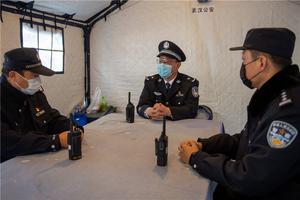 Zhang Xiaohong (center), district police chief. (PHOTO PROVIDED TO CHINA DAILY)
Zhang Xiaohong (center), district police chief. (PHOTO PROVIDED TO CHINA DAILY)
Zhang Xiaohong, a police official in Wuhan, Hubei province, said he believes the battle against the novel coronavirus pneumonia outbreak will be won soon, even though he and his colleagues are still engaged in a challenging fight.
At 1:30 am on Jan 23, Zhang, head of the public security bureau in Wuhan's Qiaokou district, received an order to deploy 300 police officers to Wuhan Tianhe International Airport for traffic control work.
"At that moment, we knew the battle to protect Wuhan had begun," Zhang said.
To carry out the mission, Zhang quickly established 10 teams and three commanders and launched a round-the-clock work schedule. Since then, 1,500 police officers in the district have devoted themselves to the fight.
"We are responsible for the control work at junctions, in communities and hospitals, and we are also in charge of keeping public order and offering services for local residents," Zhang, 58, said.
Over the past month, the bureau has arranged for more than 350 police officers to inspect the epidemic situation in 129 communities and has transferred more than 400 to help with control work in 47 hospitals and quarantine sites.
"I'm proud of my colleagues, as they're not afraid of difficulties and challenges during the outbreak," he said while sharing stories with the media at Sunday's news conference.
Last week, police officer Yi Xin, 24, received a call saying a patient urgently needed to be taken to hospital from their home, an old building without an elevator. At the risk of being infected, Yi carried the patient, who was vomiting, from the sixth floor and drove him to a hospital.
"Our police officers may be infected at any time, as we contact the patients every day," Zhang said.
He said one example involved six police officers who took the initiative to help medical workers control the situation in a makeshift hospital, meaning they could not return home for 28 days.
"I asked Peng Cong, one of the six officers, whether he was worried about being infected in that place," Zhang said. "He told me 'yes', but said he must rush forward when everyone feels afraid, because he is a police officer.
"Where the difficulties are, that's where we are. Where the epidemic is, that's where we are fighting.
"I always believe the coldest winter will pass, and the most beautiful spring will finally come."
Future expectations
Some of my colleagues told me they want to go back home as soon as possible after the epidemic ends to have the family reunion dinner that they missed on the eve of the Spring Festival, while others said they hope to restart our football league to enjoy matches and organize volunteers to intensify public security in communities after they win the battle against the virus.
What I hope for most now is to see police officers who fell ill get well soon and chat with them. When we win this battle, I am looking forward to witnessing the return of the hustle and bustle of the city.
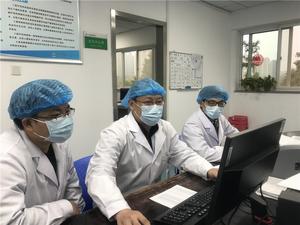 Yu Ting (center), doctor. (PHOTO PROVIDED TO CHINA DAILY)
Yu Ting (center), doctor. (PHOTO PROVIDED TO CHINA DAILY)
Standing inside a quarantined ward in a white hazmat suit, Yu Ting often presses the daily medical records of critical patients infected with novel coronavirus pneumonia against a window at the ward's entrance, allowing nurses to copy the updates from the outside.
"The records are contaminated with the virus and cannot be brought outside," Yu, a doctor at Wuhan's Jinyintan Hospital, told local media previously.
Documenting patients' conditions has been the daily routine for the 43-year-old doctor, who has been serving as one of the ward directors at the hospital since the outbreak began in December.
His wife, Ding Na, works as a nurse for critical patients just two stories above Yu's wards, yet they hardly talk to each other.
"She sometimes comes to my floor to pick up medicine," he said. "I recognize her by the signature on her hazmat suit, but we often walk past each other because we are busy."
"Once we put on this white suit, we must remember our sacred task of healing the sick and wounded. This is what we must do, even when we are very tired," he told Sunday's news conference.
Yu said the phrase he feared the most was: "white suit, white suit, where are you? Please save my…" The words often jolt him into action, rushing to help those in need.
As of Saturday, the hospital had treated more than 2,000 severely and critically ill patients. While 1,200 have recovered and been discharged, not all have been so lucky.
At around 2:30 am on Feb 19, Yu received a distress call saying an 83-year-old patient was experiencing respiratory failure. Yu and seven other medical workers rushed to the ward and tried their best to save the elderly man. But their effort was in vain and the man died two hours later.
"Sometimes, the situation really does feel hopeless, but we only think about trying harder to save the patients, and maybe miracles can happen," he said.
In early February, Chen Yihe, an 82-year-old patient who recovered and was discharged, posed for a photo while holding Yu's hands.
"That photo has become my most prized possession," Chen said. "It was Doctor Yu who pulled me from the brink of death."
Yu said he is elated when he sees patients overcoming the disease one by one and leaving the hospital with smiles.
"I am very moved, and this is a form of encouragement for the minds and bodies of our staff members," he said.
Future expectations
I asked my medical staff members what they want most, and they all said they hope the epidemic will end as soon as possible. Our bodies and spirits have been pushed to the limit, but we are still fighting on.
This epidemic has taken the lives of many elderly patients, especially those with underlying health problems. Many of their children have cried in the hospital's halls. I hope our scientists can produce effective drugs against the virus soon.


